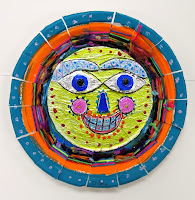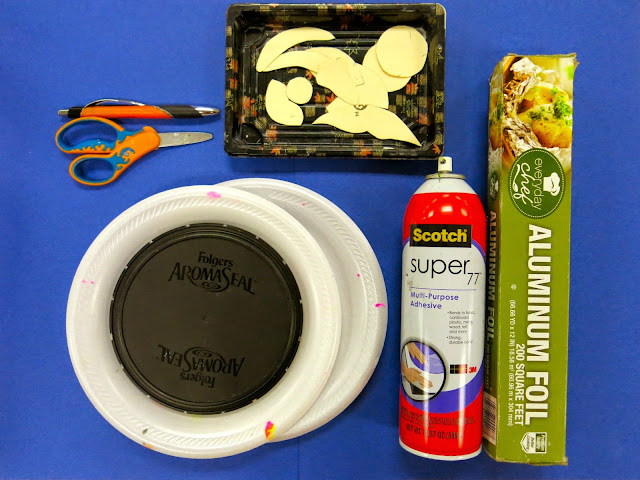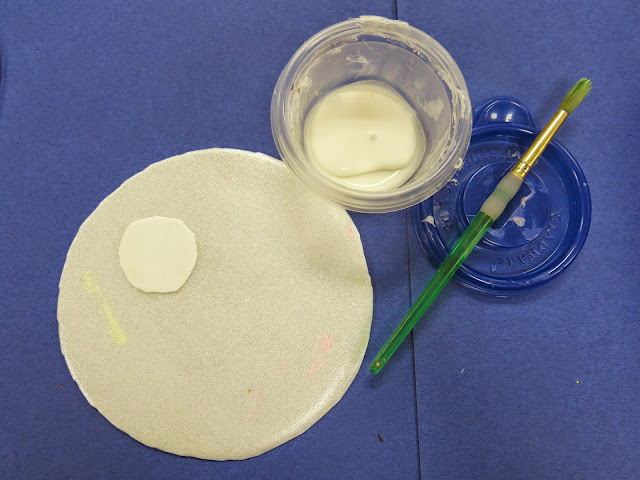You know, as an art teacher, I just can't seem to teach short and simple lessons. I ain't braggin'. It's a real problem. I mean, what you are looking at here took us 4 weeks of art class to complete (that'd be 4 hours). What with the metal relief, the coloring, the puffy painting, plate painting and weaving, I thought the entire thing would never end. However. Looking through the stacks of these masterpieces and reading the kid's artist statements about their work (as well as the sweet notes that my second grade kids wrote them about their artwork), I like to think it was all worth it. That being said, you had better believe our next project is gonna be, well, less than four weeks. Like, maybe three and a half.
So just how did this whole project come to be? Well, I go the idea for the metal design from Denise Logan in her book and on her website, she shares the lesson of creating a Mexican sun. I love her lesson but decided to take the process one step further by adding the woven edge. This is the same group of fourth graders that created these stitched creations. Their fingers were itching for more fibers arts so I thought, why not give the kids what they want?
The process for the sun/moon plate was much like the one my third grade students created for their dots. To begin the project, on our first day, we reviewed what we new about Mexico with this prezi. Then, I introduced the ceramic work of the artists in Metepec, Mexico with this prezi.
After that intro, the kids were given this sketching sheet to hash out some ideas. I set my Time Timer for 7 minutes and told them to meet with me again when the timer went off.
By the way, here's a lil shopping list for you:
Once the timer went off, we met again to talk about how to make our sketch a reality. First step, cut out two circles. One will be for the face the other, the parts.
Trace template pieces or create your own template pieces on your sketch paper. Cut those out and trace around them. I discouraged the kids from sketching directly on the styro as they couldn't erase those lines.
Start gluing those pieces in place. By the way, I don't use glue bottles in my art room as they are the Root of All Evil (I remember the moment I saw a child attempt to use the blade of a brand new pair of scissors to unclog a bottle whilst another proceeded to bust off the tip of his pencil lead during his stabbing/unclogging attempt. Forever after that, it's been glue in a cup and paint it on.)
This was about all we managed on that first day. Each kid was given an envelope to put their pieces in for the following art class.
During our second art class, the kids finished cutting out and gluing pieces. The kids could decide if they wanted to make a sun, a moon or a combo of both. When they were finished, they came to see me at the Super Amazing Spray Glue Table where I spray glued their work and placed foil atop. IF they wanted a sun/moon, I sprayed their styro face and gave them yarn to lay on top however they wanted it.
Massage the plate but do not use your fingernails. That will tear the foil and make for a super sad art teacher.
From there, color was added with Sharpie. Now, I did have to make one muy importante rule: The background of the face needs to be ONE color (unless it's a sun/moon). Here's why I did that: I noticed the kids were picking colors at random and they were losing the face completely. I told them that the raised pieces could be any color they wanted but that the background was to be one solid color. No one's creativity appeared to be crushed during the enforcement of that thar rule.
Once coloring was complete, the kids entered Puffy Paint land. WHICH they loved, according to their artist statements.
During our next art class, the kids painted the outer edge of a large Chinet plate (I suppose if you wanted a shorter project, have the kids create smaller faces and use smaller Chinet plates? Just a thought). That only took them 15 minutes which gave them more time to finish their coloring and puffy painting from the previous class. I did have a couple early finishers who began our next project: Ojos de Dios!
The following class, the paint had dried so the kids cut their plates and started weaving. I gave the kids a template with 19 notches cut into it. They laid the template on their plate, cut the notches and started to weave. I do a weaving project every year with my students so a quick reminder that weaving is over and under and they were off running.
Me: Oh my goodness, I love your sun/moon! Can I ask what's on her lip?
Student: She has one of those sores that I get in the winter.
Me: Um, like, a cold sore?
Student: Yeah, that's it! I wanted her to have a cold sore.
(OMG, I die.)
Once the kids wrapped up their weaving, they were to write an artist statement. We chatted about how we could either write about the process, the product or something we learned. Once those were complete, they were glued to the back of the weavings. Reading those statements was hilariously enlightening.
So apparently the kids like puffy paint. I did have several kids write about something called "puppy paint". Um, what?! Do they think I'm so cruel that puppies were harmed in the making of said paint?! Guess we need to have a chat. OR I need to do a better job enunciating.
My school district is joining in on a Be Nice Campaign. The kick off was this week. So I decided to have a weekly Give Nice a Try post in my art room. Sometimes we'll have time to give it a go in the art room...however, often times, I'll be counting on the kids to do this on their own time. This week, it worked out for my sweet second graders to write a nice note to the fourth grade about their finished pieces.
Here are the second graders writing their nice notes to the fourth grade.

I double checked all notes before giving them out to the fourth grade. I wanted to be sure they were nice. This one was especially sweet.
The fourth graders were pretty stoked to get feedback about their artwork. I had them write thank-you notes to their new second grade friends. This note really showed the impact of our letter writing campaign.
And there you have it! Even though this project took us forever, did involve relief sculpting, Sharpie coloring, painting and weaving (oh, and puppy paint, ha!) all while learning the history of the Metepec suns of Mexico. What's your fave long-winded art project? Please tell me I'm not the only one with million-year art projects, y'all!

So just how did this whole project come to be? Well, I go the idea for the metal design from Denise Logan in her book and on her website, she shares the lesson of creating a Mexican sun. I love her lesson but decided to take the process one step further by adding the woven edge. This is the same group of fourth graders that created these stitched creations. Their fingers were itching for more fibers arts so I thought, why not give the kids what they want?
After that intro, the kids were given this sketching sheet to hash out some ideas. I set my Time Timer for 7 minutes and told them to meet with me again when the timer went off.
By the way, here's a lil shopping list for you:
- Cheapo Styro Plates. I mean the really cheap kind. Two for each kid.
- Cheapo Foil.
- Spray Glue. 3M's my jam.
- Ink Pens. They work best on styro as they don't cut into it like pencils.
- Face Template. Hate me if you wanna, we used facial parts to trace for those who didn't feel confident in drawing their own facial pieces.
- Circle Temple.
Once the timer went off, we met again to talk about how to make our sketch a reality. First step, cut out two circles. One will be for the face the other, the parts.
Trace template pieces or create your own template pieces on your sketch paper. Cut those out and trace around them. I discouraged the kids from sketching directly on the styro as they couldn't erase those lines.
Start gluing those pieces in place. By the way, I don't use glue bottles in my art room as they are the Root of All Evil (I remember the moment I saw a child attempt to use the blade of a brand new pair of scissors to unclog a bottle whilst another proceeded to bust off the tip of his pencil lead during his stabbing/unclogging attempt. Forever after that, it's been glue in a cup and paint it on.)
This was about all we managed on that first day. Each kid was given an envelope to put their pieces in for the following art class.
During our second art class, the kids finished cutting out and gluing pieces. The kids could decide if they wanted to make a sun, a moon or a combo of both. When they were finished, they came to see me at the Super Amazing Spray Glue Table where I spray glued their work and placed foil atop. IF they wanted a sun/moon, I sprayed their styro face and gave them yarn to lay on top however they wanted it.
From there, color was added with Sharpie. Now, I did have to make one muy importante rule: The background of the face needs to be ONE color (unless it's a sun/moon). Here's why I did that: I noticed the kids were picking colors at random and they were losing the face completely. I told them that the raised pieces could be any color they wanted but that the background was to be one solid color. No one's creativity appeared to be crushed during the enforcement of that thar rule.
Once coloring was complete, the kids entered Puffy Paint land. WHICH they loved, according to their artist statements.
During our next art class, the kids painted the outer edge of a large Chinet plate (I suppose if you wanted a shorter project, have the kids create smaller faces and use smaller Chinet plates? Just a thought). That only took them 15 minutes which gave them more time to finish their coloring and puffy painting from the previous class. I did have a couple early finishers who began our next project: Ojos de Dios!
The following class, the paint had dried so the kids cut their plates and started weaving. I gave the kids a template with 19 notches cut into it. They laid the template on their plate, cut the notches and started to weave. I do a weaving project every year with my students so a quick reminder that weaving is over and under and they were off running.
Me: Oh my goodness, I love your sun/moon! Can I ask what's on her lip?
Student: She has one of those sores that I get in the winter.
Me: Um, like, a cold sore?
Student: Yeah, that's it! I wanted her to have a cold sore.
(OMG, I die.)
Once the kids wrapped up their weaving, they were to write an artist statement. We chatted about how we could either write about the process, the product or something we learned. Once those were complete, they were glued to the back of the weavings. Reading those statements was hilariously enlightening.
So apparently the kids like puffy paint. I did have several kids write about something called "puppy paint". Um, what?! Do they think I'm so cruel that puppies were harmed in the making of said paint?! Guess we need to have a chat. OR I need to do a better job enunciating.
My school district is joining in on a Be Nice Campaign. The kick off was this week. So I decided to have a weekly Give Nice a Try post in my art room. Sometimes we'll have time to give it a go in the art room...however, often times, I'll be counting on the kids to do this on their own time. This week, it worked out for my sweet second graders to write a nice note to the fourth grade about their finished pieces.
Here are the second graders writing their nice notes to the fourth grade.

I double checked all notes before giving them out to the fourth grade. I wanted to be sure they were nice. This one was especially sweet.
The fourth graders were pretty stoked to get feedback about their artwork. I had them write thank-you notes to their new second grade friends. This note really showed the impact of our letter writing campaign.
And there you have it! Even though this project took us forever, did involve relief sculpting, Sharpie coloring, painting and weaving (oh, and puppy paint, ha!) all while learning the history of the Metepec suns of Mexico. What's your fave long-winded art project? Please tell me I'm not the only one with million-year art projects, y'all!




























































































